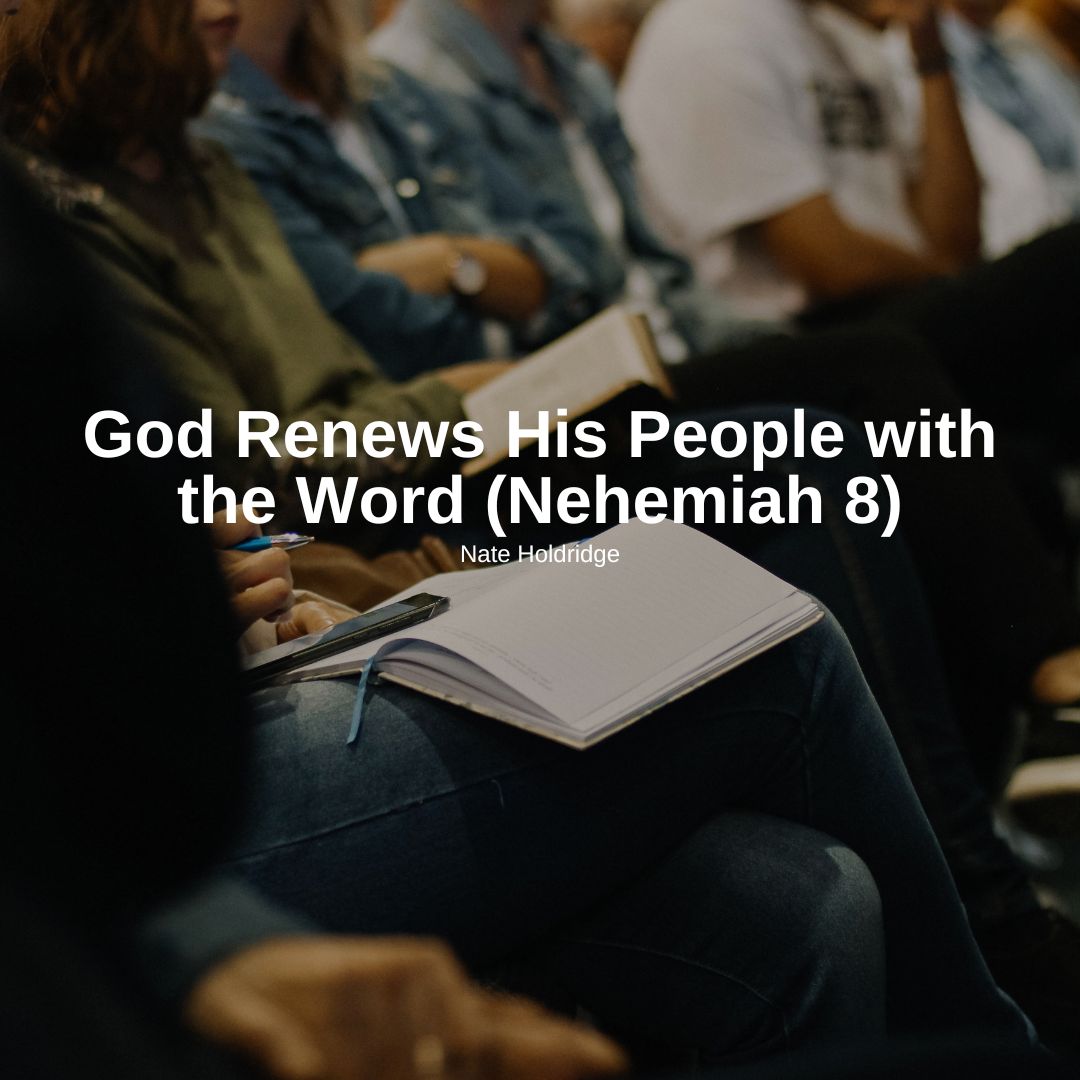
So Ezra the priest brought the Law before the assembly, both men and women and all who could understand what they heard, on the first day of the seventh month. And he read from it facing the square before the Water Gate from early morning until midday, in the presence of the men and the women and those who could understand. And the ears of all the people were attentive to the Book of the Law. (Nehemiah 8:2–3, ESV)
Because Calvary Chapel methodology has focused on the simple teaching of the Word, Nehemiah 8 has long been a favorite in Calvary Chapel circles. It is a significant chapter, not just for our ministry philosophy, but in the story of Nehemiah. As much as Nehemiah is the central character, the book of Nehemiah is about God—another instance of God working hard to renew his people. And, after the fifty-two days of rapid repair of the walls and gates of God’s city, it was time for God to work on his people. He knew renewal could not come without the Word, so he laid it upon Nehemiah’s heart to lead the people into the study of Scripture.
Nehemiah knew the renewal he hoped for required more than rebuilt walls—the people had to become a Bible-centered people. For this, a scribe-priest named Ezra is introduced (Neh. 8:1). If all we had was Nehemiah 8, we might assume Ezra only recently emerged, but the book of Ezra tells us that he’d arrived fourteen years earlier (Ezra 7). And, to the best of his abilities, he’d taught the people the Bible, saying hard things the people needed to hear (Ezra 9:1-4, 10:2, 10).
Ezra might have been responsible for much of Nehemiah’s success. His teachings likely readied the people for a leader like Nehemiah to arrive. And Nehemiah seems to have prepared the people for more of Ezra’s work—along with the walls and gates, Nehemiah built a wooden platform for Ezra for the purpose of declaring the Bible (Neh. 8:4). Through Ezra’s work, we see a vivid example of how God renews his people with his Word.
They Exalted the Word (Nehemiah 8:1-8)
First, they exalted the Word, meaning they had a high respect and desire for whatever God said. What do I mean? And how can we exalt it today?
Recognize Its Authority
Notice how they recognized the authority of God’s Word by, over and over again, referring to it as Law. They told Ezra to bring the Book of the Law of Moses (Neh. 8:1). They considered that law what the Lord had commanded(Neh. 8:1). So Ezra brought “the Law” (Neh. 8:2), and their ears were attentive to the Book of the Law (Neh. 8:3). Other priests mixed into the crowd to help the people understand the Law (Neh. 8:7). And they called it “the book, the Law of God” (Neh. 8:8).
But the authority of the Bible is also seen in the way they treated the book. There was the platform they built to elevate it above them—this wasn’t only an aid to the audio-visual presentation, but a way to demonstrate their subservience to whatever God said (Neh. 8:4). This is reinforced with the statement, “Ezra was above all the people” (Neh. 8:5). And when Ezra opened the book, all the people stood (Neh. 8:5). As Ezra read and others explained, the people lifted up their hands, bowed their heads, and worshipped the Lord with their faces to the ground” (Neh. 8:6). And—on top of all this—the reading lasted around six hours, from early morning until midday (Neh. 8:3). That’s two Lord Of The Rings movies—ultimate reverence for the Word.
The people had an attitude of total respect for the Bible that day. And if we want to experience God’s best—his renewal—in our lives, we must have the utmost respect for his words. The book is beautiful and worthy of its authoritative position over us. The truth is that God is the only one suited to be the master of our lives. Everyone and everything else is flawed, imperfect, and lacking the best motives—this includes us. God is the better master.
Understand It
But beyond recognizing its authority, we should also notice how hard they worked to understand the Word. The only people there that day were men and women and all who could understand what they heard (Neh. 8:2). The wooden platform was meant to make the work intelligible—everyone wanted to hear Ezra read. And a team joined Ezra and helped the people understand the Law (Neh. 8:7). The people remained in their places while these teachers came to explain the Bible to them (Neh. 8:7). They read from the book, from the Law of God, clearly, and they gave the sense so that the people understood the reading (Neh. 8:8).
And since understanding was the goal, the people were radically and substantially changed. This is seen in the way the Word impacted their bodies. In the sixth verse, the people answered with their mouths, lifted up their hands, bowed their heads, and worshipped the Lord with their faces to the ground (Neh. 8:6). But their feet and mouths and hands and faces were moved because they first understood with their ears. Before anything else, their ears were attentive to the Book (Neh. 8:3).
This passage certainly presents a strong case for Biblical exposition—teaching the Bible in a way where it is clearly presented to God’s people—but this passage also presents a strong case for personal Bible study. We live in a strange time—in the English-speaking world, the Bible is widely circulated in various helpful translations, study guides and helps abound, and personal Bible study is commended by every denomination and strain of Christianity, but learning the contents of the Bible is a largely neglected discipline.
Theologian J.I. Packer attributed this to a few causes, the first two being liberal theology telling us the Bible should not be followed and biblical criticism telling us the Bible cannot be trusted. But he presents an interesting third reason people do not discipline themselves to learn the Word anymore:
Our culture tells us that apart from technical professional stuff, only a smattering of knowledge about anything is needed to see us through, so that it would be rather naive for a Christian to spend much time learning details of any sort about Christianity. But the truth is that as the desire to learn what God has revealed in Scripture, so that we may serve him by response to his Word, is Spirit-given and enlivening, so a lack of willingness to do so is Spirit-quenching and deadening.1
They Had Joy because of the Word (Nehemiah 8:9-12)
So the first way God renewed his people with his Word had to do with their attitude: they esteemed the Word. The second way had to do with their response—they needed to have joy because of the Word. Let me explain what I mean.
Context
After interacting with the Bible for six hours, the people began to mourn and weep as they heard the words of the Law (Neh. 8:9). And this was not brought on by a dramatic presentation but the simple exposition of the Bible. It seems they were grieved by the gap between what the Word said they should be and what they were (Neh. 8:11). As we saw in 2 Timothy 3:16, the Word is profitable for correction— and the people stood corrected for their sins, so they wept.
But Nehemiah and Ezra and the Levites knew that, on this occasion, the people should not mourn or weep (Neh. 8:9). They knew that day was holy to the Lord (9). Why?
First, that time of the calendar year was the Feast of Trumpets, meaning it was meant to be a time of celebration. Though they had disobeyed him for many years, God was ready to reinstate them into joyful encounters with him at Jerusalem’s temple. At the temple, they could sacrifice, and as they read the Law, they would’ve discovered their need for sacrifices.
And second, God was giving them another opportunity to repent, turn, and walk with him afresh. He had brought them back from their Babylonian captivity for a reason, and they should’ve celebrated and rejoiced that God was working to mature them. He would not divorce himself from them but instead was wooing them back into a love relationship with himself. They were a historically imperfect people, but God had made a way for them to be forgiven!
The Joy of Grace
It was because of all this that Nehemiah made a brief speech (Neh. 8:9-10). He said, “Go your way. Eat the fat and drink sweet wine and send portions to anyone who has nothing ready, for this day is holy to our Lord. And do not be grieved, for the joy of the Lord is your strength” (Neh. 8:10).
This was a timely word—the people could have easily been crushed. Of Jesus, Matthew said, “A bruised reed he will not break, and a smoking flax he will not quench” (Matthew 12:20). Nehemiah lived out Christ’s nature here—he would not let a bruised and smoldering people be broken or extinguished.
But what did Nehemiah mean when he said, “The joy of the Lord is your strength”? (Neh. 8:10). This was not a flippant statement, a Hallmark card or cat poster sentiment. Nehemiah wasn’t delivering an empty platitude.
Instead, he told them to be strong in the joy of God’s gracious work in their lives. They had read the book. They had come face to face with their imperfections. But God had not eliminated them. He was reviving and drawing them. They should’ve had joy that God was working in and on their lives. God’s grace toward them should have given them a joyful strength.
Some people have the grace of joy and are naturally happy, but Nehemiah was referring to the joy of grace—the ecstatic gladness that though we continually fall short, God’s grace means he is still at work in us. And that knowledge of his grace should bring us intense joy. As long as you are alive and the gospel is true, his grace is sufficient for you. Repent, turn to him in obedience, and have joy that he is still shaping your life as the potter shapes the clay (Is. 64:8).
He is at work! Don’t allow your sense of conviction to outweigh the knowledge God is working in you. Don’t allow the knowledge of your sin to outweigh the experience of Christ as your Savior. Instead, let the conviction and sin turn into the strength of joy that God is working to reform and reshape and renew you. Be glad that he still has a plan for you if you will submit yourself to it! He is not done with you!
Where would we be if the great heroes of Christianity had not allowed the sorrow of their sin turn into joy that God was not done with them? If the joy of the Lord had not become Peter’s strength, he would have quit forever after he had denied Jesus. Even Christ’s restorative work could not have turned him. If the joy of the Lord had not become Paul’s strength, he would have forever thought himself disqualified because he’d partaken in the murder of Christians. Even the bright light on the road to Damascus would not have turned him. But we praise God that these men allowed sorrow to turn into the joy of God’s work in their lives.
They Obeyed the Word (Nehemiah 8:13-18)
So the people were renewed as they exalted the Word and walked in the joyous knowledge that God was working in them. But there was another step: obedience to the Word.
Feast of Tabernacles
The text tells us it happened on the second day (Neh. 8:13). This is often when the best of God’s revelation comes, by the way. Come back. Study again. Go deeper. When you do, God reveals himself.
So it was on that second day that the leaders of each family came to Ezra again to study the words of the Law (Neh. 8:13). These men were beginning to take their responsibilities seriously. They knew they had to prepare the next generation, and they would not leave that work to only the mothers.
As they read Leviticus, they learned about The Feast Of Tabernacles (Leviticus 23:34-44). A major facet of that feast was that the people should dwell in tents (or booths) on their flat rooftops while they celebrated (Neh. 8:14-16). That seven-day campout was meant to commemorate Israel’s long campout in the wilderness after God freed them from Egypt. When they read it in the Word, they did what the Word said. They went out to the hills around Jerusalem and cut down branches of olive, myrtle, palm, and other leafy trees to make their tents (Neh. 8:15).
The Sequence
These men did all this because they found it written in the Bible (Neh. 8:15). It had been a long time since they’d practiced this part of the feast, and much longer since the original exodus. There was nothing “normal” about this campout for them, but they saw it in the Bible and decided to do it.
The sequence of this chapter is beautiful. First, because of Ezra and the other teachers, they intellectually understood the Word. Second, they emotionally responded to the Word with mourning (and then joy). And third and lastly, they volitionally responded to the Word—they obeyed!
And what resulted? Nehemiah said there was very great rejoicing (Neh. 8:17). This rejoicing is the result of obedience. We might think that governing our own lives is a sure-fire path towards happiness. If that were true, we would expect our society to be one of the most joyful and satisfied.
The mantra (or dogma) of our day is to be yourself and live your truth. But rather than find generations of fulfilled people, we find heightened anxiety, abuse, depression, and anger. The dirty little secret is that our culture’s view of how the world works doesn’t work.
Contrary to popular belief, it is submission to God that brings true joy. Casting off the shackles of God has not led to the peace and happiness many imagined. But God patiently waits—extending the offer of forgiveness and a path back to him through the death of his Son.
My hope is that this episode in Nehemiah becomes more than an inspiring story of a people who grew to love the Bible. My hope is for this passage to become a template for your everyday life. And I pray that template will be your daily story—praise, prayer, fellowship, sacrifice, hearing from God’s Word, and obedience.
After all, even our church gatherings are meant to be a template for every other day of your week. We gather ourselves together. We sing and pray to God. We declare God’s goodness to each other as we do. We give ourselves (and our finances) to God. Then we open his book with a desire to hear from him. Then we receive his grace, sometimes in the form of communion, and depart to obey what we read. This is what every day ought to look like—it is a marvelous template to follow.
The sequence of this chapter is the path Christ himself walked. Within the Trinity, the Son understood his mission and embraced it, incarnating and becoming one of us. And, as Jesus grew from a boy to a man, he increased in wisdom and stature. He grew in his understanding of his mission.
With that intellectual understanding came an emotional response, culminating in the agony of the garden of Gethsemane where the pressure of the moment produced anxious prayers and blood-like sweat.
But that emotional response of sorrow turned to strong joy to do the Father’s will—he obeyed! He did what the God-head had decided.
_______________________________________________________________________________________
References
1 J. I. Packer, A Passion for Faithfulness: Wisdom from the Book of Nehemiah (Wheaton: Crossway Books, 1995).







